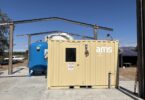We spoke to Kees Roest, Senior scientific researcher, Energy & Circular Systems, at KWR Water Research Institute, about the importance of industrial water reuse.
What exactly is industrial water reuse and how does it work?
Industrial water reuse is, in the strict definition, water that is used again in the same process. More broadly it is any used water that is recycled back to an industrial process – industrial process water can be reused, but also other water, like treated municipal wastewater can be reused in industrial processes. Treated industrial wastewater isn’t just used for industry, it can also be reused for other purposes, e.g. agricultural water. In general, I would say that a treatment step is needed to reuse the water.
Water reuse produces byproducts, typically a briny solution. Does this have any valuable uses?
The use of reverse osmosis (RO) in the treatment of water sources – for instance, for the production of drinking water, wastewater treatment effluent reuse, industrial water supply, or the production of irrigation water in greenhouse horticulture – generates a concentrate stream with high levels of dissolved components.
From a circular economy perspective the valorisation of this residual stream is desirable. However, this is generally not yet practiced. From a circular point of view it would be desirable to harvest and reuse the components from these concentrates. At KWR we are working on potential technologies that can be applied for the valorisation of components from briny solutions.
Water that is reused also often contains latent heat. Can this be harnessed?
Yes, thermal energy can even be a driver for water reuse. Especially in industrial processes were the water contains a lot of thermal energy, direct reuse can be very beneficial. Thermal energy and water reuse can also provide a positive business case.
Why are industries and governments starting to invest more in water reuse?
The availability of fresh water becomes more and more limited, but used water (wastewater) is usually available, so it makes sense to investigate (direct or indirect) reuse of this available water, because it can make industries independent of circumstances (like water scarcity).
Do you think the implementation of water reuse technology is happening fast enough? How can we accelerate the adoption of these technologies?
Some acceleration is still needed. Often only when effects of water stress become clear, investigations of water reuse begin, but as water stress and climate change increases it is important to anticipate for a sustainable future.
You’ve worked on lots of different water reuse initiatives and projects. Is there a particular case study that stands out?
Currently we are working a lot on the concentrate challenges. Industrial parties have interest in reuse and utilisation of the treated wastewater, but especially inland the concentrates that are produced when e.g. membranes and ion exchange are used, are still challenging to treat in a cost effective way. This is also because water (e.g. tap water or ground water) is still relatively cheap. Luckily, water reuse projects are often seen as sustainability projects for which other payback periods are used.
Any other thoughts?
Innovation & development is needed to bridge the gap from scientific promising technologies and concepts to application of water reuse in practice. Combination of water reuse with reuse of thermal energy and reuse of other components can have synergistic effects and improve the business case. This also supports the needed circular economy.
Related articles:
Hydroinformatics: An interview with Dragan Savic, CEO at KWR Water







